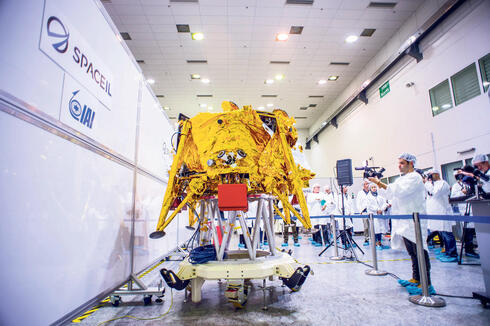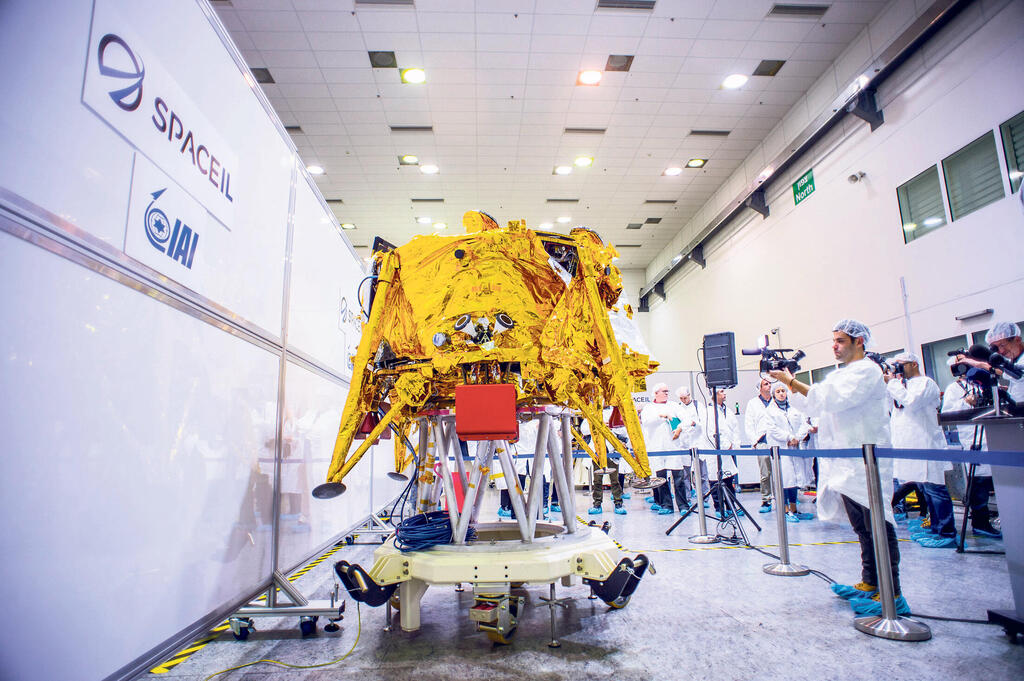
Sabra Trek: Will Israel ever reach the moon?
On April 11, 2019, Israel was about to become the fourth country to reach the moon, but the crash of the Beresheet lunar probe shattered the dream. Billionaire Morris Kahn promised to restart the project but in the meantime he has stopped providing funding, the state is in no hurry to invest, and the landing target date is only getting further and further away
At the beginning of 2019 all eyes in Israel were on the Cape Canaveral Spaceport in Florida, where the Beresheet lunar probe was launched on Space X's Falcon 9 rocket on its way to Israel's first moon mission.
On April 11, 2019, when Beresheet (which means “Genesis”) maneuvered towards landing on the moon after a 48-day journey in space, Israel came close to historic status - becoming only the fourth country to land on the moon, after the USA, China and the USSR. The fourth partner to this club was added just less than a month ago when India successfully landed their Chandrayaan-3 spacecraft on the moon.
Beresheet successfully completed its journey to the moon, including the complex maneuvers it required. A few minutes before the planned landing, at a height of only about 14 km above the surface of the moon, malfunctions began. The Israeli probe, which until then had successfully met several tough challenges, did not stand a chance this time. It quickly lost altitude and control and met the moon at a speed of one kilometer per second.
Beresheet is a project of the SpaceIL organization, founded by engineers Yariv Bash, Yonatan Weintraub and Kfir Damari in 2011 as part of a competitive venture initiated by the search giant Google. The probe itself was created by Israel Aerospace Industries (IAI), and the leaders of the program saw it as a rare opportunity to promote scientific education in Israel in a way that would fascinate children and teenagers and inspire them to take an interest in deep space exploration.
The cost of the Israeli attempt to become the fourth country in the world to land on the moon amounted to about $100 million, and about a third of the amount was donated by billionaire Morris Kahn. The wave of enthusiasm that swept the country during the long journey of Beresheet to the moon and the crash on it, led shortly after to a dramatic announcement by Kahn that he would work to finance another project, "Beresheet 2".
While being honored with a lighting of a torch at the Independence Day ceremony held just a month after the crash, Kahn went off script to announce he would again contribute to an Israeli lunar mission.
The cost of the Beresheet 2 mission is estimated at about $100 million and unlike its predecessor, it is planned to be based on three spacecraft: two landers that will land in different areas of the moon and the mother spacecraft, which will continue to circle it as part of an educational-scientific mission that will last about five years. Each of the three spacecraft will carry experiments defined by SpaceIL as "groundbreaking".
Israel's next attempt to reach the moon is scheduled for mid-2025. However, about two months ago SpaceIL announced difficulties in financing the program, after the main donors led by Kahn announced that they would not continue to invest in it. Kahn himself stated that so far funding of approximately $45 million has been obtained and that "these times oblige us to re-examine our philanthropic activities”.
So where do we go from here? The heads of SpaceIL say that they are in no hurry to give up on the dream of reaching the moon and the project that "represents innovation, courage, unity and hope in Israel", as they define it. Now they are looking for other donors who will dig into their pockets and in exchange for raising the morale of many Israelis, maybe one day they too will get the right to light a torch on Israel’s Independence Day. Until that happens, SpaceIL has updated schedules and the launch of the spacecraft has been pushed back to sometime in 2026.
The budget - only a third of the recommended amount
According to the Director General of the Israel Space Agency, Uri Oron, the budget issues that are casting a doubt over the future of the SpaceIL project are known to the Ministry of Science, and attempts are being made to obtain government assistance that will make it easier for the agency to fulfill its goals. However, in a conversation with Calcalist, Oron clarified that in any case, even if government aid is given, it is not a substantial amount and that it will not be able to come out of the agency's budget.
The Israel Space Agency's budget for 2023 is approximately NIS 100 million, a third of the amount recommended by committees that previously examined the desired budget scope for projects and programs related to the development of the local space industry. In Israel, there are currently about 60 companies operating in various aspects of space, some of them startup companies that receive grants as part of tracks by the Space Agency and the Innovation Authority. "We are talking about support to the extent of several million shekels per year. It is necessary to regularly increase this support to the extent of several tens of millions of shekels per year," says Oron.
According to him, these companies employ over 3,000 workers, they have not yet begun to reach their full potential, and their activity is often slowed by stagnation. He added that "the field of space has tremendous growth potential and Israel could be a significant player in the emerging and developing market." Oron adds that "the main difficulty for many of the companies operating in the field is around the question of how to make money from space. This is not a barrier created as a result of a market failure, but as a result of the lack of a clear business model in a way reminiscent of the Internet in the 1990's. Unlike cyber or artificial intelligence, in everything related to space, there is a need to establish an infrastructure that will support the companies' activities in the long term, and this requires deep pockets. I estimate that we will reach that as well."














